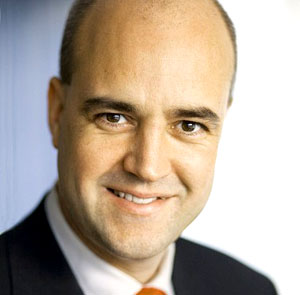The perils of picking a president
 Brussels - A current joke in European Union circles runs, "What is the hottest place in Europe?"
Brussels - A current joke in European Union circles runs, "What is the hottest place in Europe?"
The answer is "Fredrik Reinfeldt's telephone."
Sweden's prime minister currently holds the EU's rotating presidency. As such, he has been tasked with leading negotiations to appoint the bloc's first-ever permanent president ahead of a summit on November 19.
And officials say that Reinfeldt and his staff have been rarely off the phone in recent days as they have called every national leader in the EU to ask who their choice would be.
"Every one of the 27 member states should be able to have their say ... Just to reach all the presidents and prime ministers in 26 countries is a task, I can tell you," a weary-looking Reinfeldt said on a flying visit to Brussels this week.
The stakes are high. The Lisbon Treaty, which is expected to come into force on December 1, creates the posts of president and foreign-policy chief of the council of EU member states, the closest thing the bloc has yet had to a prime minister and foreign minister.
That has led to a fierce burst of lobbying among member states keen to push "their" candidates - serving or former national leaders or ministers - to the top of the EU tree.
Filling the EU's top jobs "is always messy, but it's even more complicated this time because there are more top jobs and they will have more power," said Janis Emmanouilidis, senior policy analyst at the European Policy Centre think tank in Brussels.
For much of this week, Reinfeldt has been cloistered in his office above the quays of Stockholm, phoning colleague after colleague while his aides called around Europe's capitals to set up more talks.
"When you actually speak with all 26 colleagues you have more names than jobs to offer," Reinfeldt lamented.
According to EU sources, the hours of calls produced "about 10 names" for each of the top posts.
Finding a way to reduce those lists to just two or three names before the summit looks likely to take a lot more telephone time.
"We have the main balance between left and right in politics, but as you know, that's not the only balance we're talking about - we talk about small, medium and big member states, we talk about north and south, west and east, we talk about gender issues," Reinfeldt said.
Speculation about the names on his list is intense. Across Europe, the media have published a flood of rumours, reports, leaks and analyses, praising or damning candidates as soon as they appear.
Britain is openly pushing for its former premier, Tony Blair, to get the top job. Latvia is lobbying on behalf of its former president, Vaira Vike-Freiberga, while Italy is backing its former premier, Massimo D'Alema, for the foreign policy post after British foreign minister David Miliband ruled himself out.
But beyond that circle, governments have maintained a stony silence on the key question of which names are on the list.
"We can't make any statements on this issue - there are some ideas in (our capital), but there is a total embargo on that information," one diplomat from a small Eastern European state said on Thursday.
Most candidates are reluctant to reveal themselves because to make a formal bid without overwhelming support would mean "sending the signal to your people that I'm on the way to another job but on Monday I'm back again and I didn't get it but I still love you," Reinfeldt said.
The pressure from the media to publish the list is now so great that the Swedish premier might even be looking forward to spending the next few days alone in his office with a hot telephone.
But with just days to go before Thursday's showdown, and key events such as a summit with Russia set to take up much of his available time, he must be wondering how far telephone democracy will take him - and how much will have to be left to the summit itself.
"I could foresee that I might need to work with it until we arrive at our council (summit) dinner," he said. (dpa)